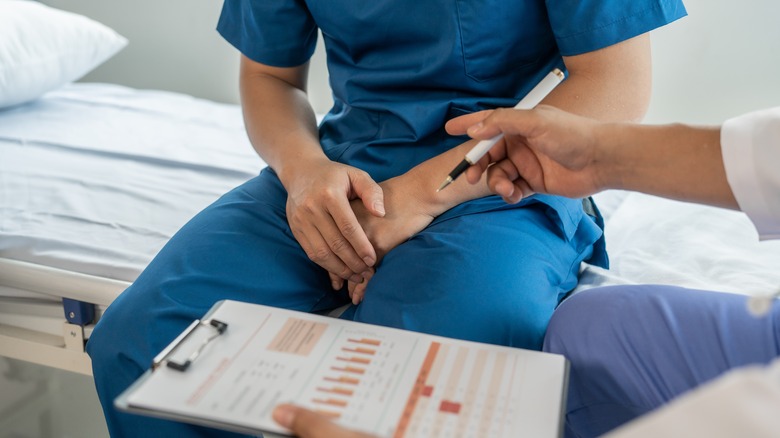When You Stop Having Sex, This Is What Happens To Your Prostate
Sex is something we turn to for a lot of reasons. We like feeling close to our partners. We enjoy the stress relief that comes with a good orgasm. And we definitely enjoy how good all of it can feel (provided the person you're with is doing and saying all the right things, of course). Sex can be about improving self-esteem, too. Additionally, sex has been associated with lowering blood pressure levels, boosting mental health, a better immune system, pain relief, and even better sleep.
But what happens when you stop having sex? As it turns out, men in particular have one thing to be concerned about: their prostate. According to a 2016 study involving 31,925 men published in European Urology, participants who self-reported to ejaculating more than 20 times a month had a 20% lower risk of prostate cancer when compared with the men who ejaculated between 4 and 7 times a month. How does ejaculation reduce your risk of prostate cancer, though?
The connection between regular ejaculation and prostate cancer risk
A prostate is a part of a man's reproductive system. It performs the all-important task of producing the fluid that keeps sperm healthy and also transports sperm to where it needs to go. When a man ejaculates during sex, sperm travels via the urethra to exit the body. The idea is that carcinogens have a way of naturally building up in one's prostate, and this increases one's risk of developing cancer. This is also called the prostate stagnation hypothesis.
"When men ejaculate, the prostate gland releases fluid that can potentially flush out toxins from the prostate gland," shared the chief of urology at The Hospital of Central Connecticut, Dr. Ryan P. Dorin (via Hartford Healthcare). "It's possible that doing this more regularly helps keep cancer-causing substances at bay too."
Another study in European Urology, published in 2018, found a link between ejaculation frequency and prostate tumorigenesis. Additionally, sex and ejaculation promote blood flow to the man's reproductive system (including the prostate). A healthy prostate can mean less of a cancer risk, too. Does this mean that everyone who has a prostate should be worried about their health when they're not having sex? What happens if sex is not an option for you right now?
Masturbation could have the same benefits as sex when it comes to prostate health
According to Dr. Ryan P. Dorin, what method you use for ejaculation doesn't really matter, as long as there is release, so to speak (via Hartford Healthcare). Masturbation can be a good substitute if you're concerned about prostate health.
Per the American Cancer Society, about 1 in 8 men will be diagnosed with prostate cancer (one of the most common types of cancer) in their lifetime, so if having sex or masturbating can help reduce your risk, why not? However, it is also important to note that not all experts are sure that having sex or masturbating frequently can reduce your risk of prostate cancer. There aren't a whole lot of studies, apart from the ones in European Urology, that have focused on this specific concern.
Perhaps we need more studies before arriving at definite conclusions about what happens when you stop having sex. But in the meantime, this could be a good reminder to prioritize your sex life and the health of your prostate. Eating less trans fats and saturated fats, consuming more fruits and vegetables, avoiding charred meat, getting regular exercise, maintaining a healthy weight, limiting alcohol intake, and quitting smoking are all ways in which you can reduce your risk of developing prostate cancer. While you're at it, make sure to keep up with your prostate cancer screenings too, especially once you reach middle age.



